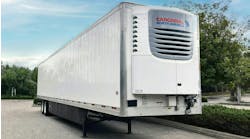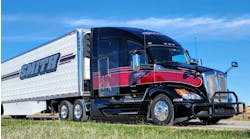The success in reaching the first phase of greenhouse gas and fuel efficiency standards for heavy-duty vehicles and the new challenges facing truck and engine manufacturers in achieving the proposed second phase of regulations were outlined during a rulemaking hearing conducted by US Environmental Protection Agency (EPA) and National Highway Traffic Safety Administration (NHTSA) officials.
Allen Schaeffer, executive director of the Diesel Technology Forum, testified at the Chicago hearing on behalf of the diesel industry. Witnesses included environmental, health, industry and science representatives during the first of two national hearings on the proposed rulemaking to adopt Phase 2 of national greenhouse gas emission reduction and fuel efficiency requirements for medium- and heavy-duty trucks. The second hearing is scheduled for August 18 in Los Angeles.
“Today, manufacturers of commercial trucks, engines and their components produce the cleanest, safest, and most fuel-efficient technology in the world, and over 95% of those vehicles are powered by diesel engines,” said Schaeffer. “Advances in diesel engine technology will continue to contribute to the overall efficiency gains of vehicles under this proposed rule. As a result, we expect diesel technology to remain the primary power plant for commercial trucks into the foreseeable future.” Schaeffer said.
He said diesel will continue to be the technology of choice because it offers a combination of power, increasing energy efficiency, work capability, reliability and now near-zero emissions environmental performance, along with an ability to use a variety of low-carbon renewable diesel fuels.
Schaeffer said that since 2000, the leaders in clean diesel technology and the EPA have worked cooperatively in establishing a regulatory pathway that brought about the introduction of an entire new generation of clean diesel engines for both on- and off-road applications.
“Manufacturers have met the challenge to virtually eliminate both nitrogen oxide and particulate emissions from diesel engines, reducing emissions by as much as 98% from previous levels,” said Schaeffer.
According to state vehicle registration data for 2014, of the roughly 9.2 million Class 3-8 heavy-duty vehicles on the road nationwide, about 38%, or 3.4 million vehicles, are deployed with a 2007 or newer model year engine. Of these, 20% or roughly 1.9 million vehicles on the road meet the 2010 emissions milestone that requires near zero levels of both particulate matter and NOx emissions, Schaeffer said.
The Fuels Institute said that by 2023 diesel engines will power between 95% and 97% of all medium- and heavy-duty vehicles despite introduction of alternative fuels and powertrains, including all-electric-, fuel cell-, and natural gas-powered vehicles.
As EPA works to develop the final Phase 2 rules, Schaeffer said it is important that the rule must be a national program uniform to all 50 states including California; remain fuel neutral in nature; provide ample lead time and stability; be compatible with the needs and complexities of the diverse marketplace; be mindful of the other requirements placed on industry relative to environmental and safety requirements of commercial vehicles; harmonize standards to the greatest extent possible, and carefully consider the longstanding trade-off between NOx and CO2.
For more information, go to www.dieselforum.org.




